Flaming Turkestan. What led to the 1916 uprising of the year in Central Asia and what were its consequences?
Although the Russian army had units staffed by Muslims, only volunteers served in them - mainly representatives of the North Caucasian peoples and "Transcaucasian Tatars," as Azerbaijanis were then called. Of the Central Asians in the tsarist army, only Turkmen were famous for their valor and military skills. The tsarist officials could not think of anything better than how to assign a call for compulsory work on the eve of the holy month of Ramadan for Muslims. In addition, in the agricultural areas of Turkestan, agricultural work was in full swing and the peasants did not want to get off the ground to go to the front-line strip to dig trenches.
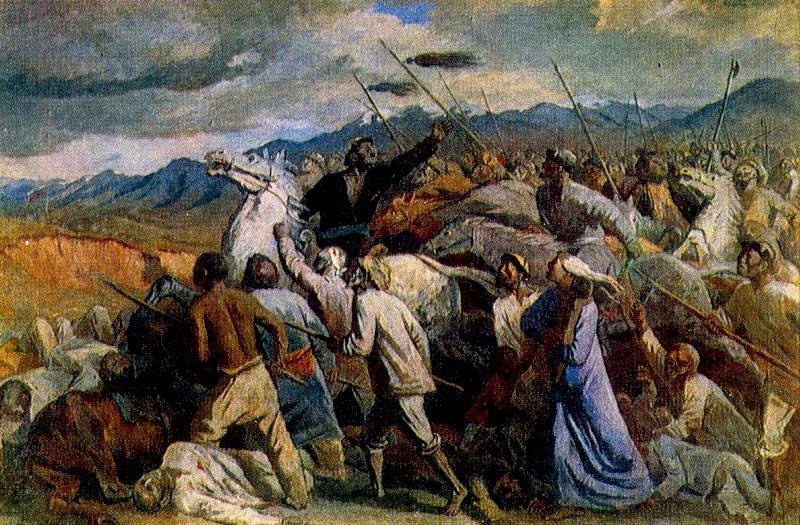
The Turkestan uprising, which covered the territory of Kazakhstan and Central Asia and led to numerous victims, had several main reasons. First, the most important factor that made the uprising itself possible was the sociocultural contradictions that existed between the Muslim population of Turkestan and Russia as a whole. Recall that was the 1916 year. Many areas of Central Asia were conquered only forty years ago. The native population continued to lead a traditional way of life, was culturally influenced by the clergy and local feudal lords. Despite the fact that numerous Russian settlers rushed to Turkestan, primarily to the Kazakh steppes, and the tsarist government supported the colonists in every way, hoping to create loyalty centers among troubled natives with their help, there was a tough isolation between the indigenous population and Russian colonists. The Russian-Cossack population lived closed, not mingling with the locals, and the contacts were reduced, as a rule, to business communication. In the perception of the Turkestani, the settlers were strangers, invaders.
The second key factor that created the prerequisites for an uprising was the erroneous and ill-considered policy of the royal authorities. There was no systematic organization in the management of the Turkestan lands and a clear line in relation to the local population. The personnel aspect was also very important. On the ground, the government’s policies were implemented by no means the best representatives of the military and civil bureaucracy. Central Asia was considered to be a kind of place of exile, to which either people who had a punishment in the service went, or adventurers who hoped to get their hands. Rarely among the managers there were real patriots who thought not about their own well-being, but about the interests of the state. Even rarer shots were the officials, who were really interested in their way of life, history Turkestan, who knew at least one of the local languages.
At the height of the First World War, when ferment amongst the Turkestan population began, a frankly provocative position was adopted, in accordance with which the Turkestanians had to take off the headdress when they met with a Russian military or civilian official. Naturally, it offended many locals. Periodically, officials completely unreasonably attacked religion, even managed to prohibit the performance of the Muslim holy hajj to Mecca.
The third factor, which also played a crucial role in the preparation of the uprising, was the subversive activities of the Turkish agents. By the time of the start of the First World War, Pan-Turkic ideas became widespread in the Ottoman Empire. All regions with a Turkic-speaking or culturally similar Muslim population were included in the “Turkic world”. At that time, most of these regions were part of the Russian Empire — the North Caucasus, the Transcaucasus, the Volga region, Kazakhstan, and Central Asia. The Ottoman Empire and previously claimed the role of the main patron and protector of Muslims living in the Russian Empire - Russia acted in a similar way, taking care of the interests of the Christian population of Palestine and Syria, who were part of the Ottoman Empire.
The tsarist government was wary of the Muslim clergy, considering it a conductor of Ottoman influence. This was successfully used by the Turkish special services, which turned religious circles against the Russian authorities. The domination of Russia in Central Asia was presented as a temporary phenomenon, and preachers called on local Muslims to create a Sharia state under the auspices of the Turkish Sultan, the Caliph for all Orthodox. The Turkish and German agents acted in the neighboring areas of East Turkestan (now the Xinjiang Uygur Autonomous Region of China), which was formally part of China, but was practically not controlled by the central authorities of the country. From East Turkestan propagandists penetrated the territory of the Russian Empire, it was carried weapon.
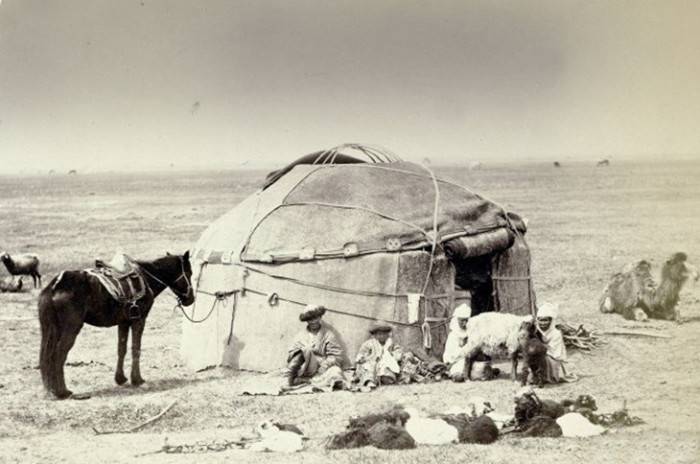
In these difficult conditions, the tsarist government continued to pursue a short-sighted policy, which led to a deterioration in the economic situation of the already poor people of Turkestan. Anti-Russian ideas found fertile ground precisely when the Turkestans felt the effects of tsarist politics on their stomachs. Thus, taxes on residents of Turkestan increased by three to five times. The sedentary Uzbek and Tajik population was forced to increase cotton picking. The nomadic Kazakhs and Kirghiz took meat, cattle, even warm sheepskin coats. The collection of taxes was accompanied by numerous excesses. Finally, the very strong indignation of the Turkestanians was also caused by the redistribution of the best lands in favor of the Russian colonists. Therefore, the decision that 250, thousands of Uzbeks and Tajiks, and 230, thousands of Kazakhs and Kyrgyz, that is, hundreds of thousands of families to be deprived of their breadwinners, will be called up for compulsory work in the front-line strip.
At the same time, blaming the Turkestan population in evading conscription in such a difficult wartime for the country is very stupid. Then, at the beginning of the twentieth century, overwhelmingly, the representatives of the peoples of Turkestan did not identify themselves with the Russian state, the war was alien to them, they did not know the history and geography of Russia, and even had no idea where they were going to be sent to work. Do not forget that the royal authorities have absolutely nothing done to explain to local residents the meaning of the decree on mobilization. Moreover, local officials acted rudely and brutally against the local population. The social factor also increased - rich Turkestanians were able to freely buy off the draft, so sending them to the compulsory work of the luminaries only for the majority of the poor people in the region.
On July 4 (old style) the first mass action against mobilization took place in Khujand. But in this case, the authorities did not find anything smarter than how to simply disperse the demonstration without drawing any conclusions for themselves. As a result, only in July 1916 there were 86 performances in the Fergana region, 26 - in the Syrdarya region and 20 - in the Samarkand region. 17 July 1916 authorities were forced to impose martial law in the Turkestan military district. However, it was too late. The uprising swept almost the whole of Turkestan.
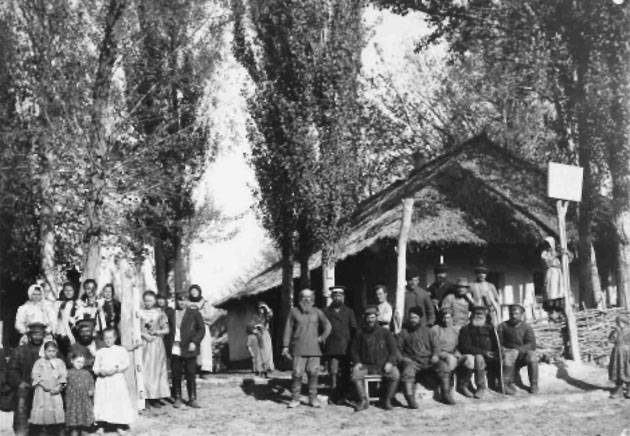
With its short-sighted policy and unskillful actions, the tsarist government substituted, first of all, the Russian and Cossack population living in the region. It was the Russians and the Cossacks who became the main victims of the raging popular element. Since most of the men from among Russians and Cossacks by this time were called up for military service and were at the front, the settlements were virtually defenseless. The rebels, who were proclaimed by preachers and Turkish agents with extremist slogans, acted with extreme cruelty. They launched a real terror against the peaceful Russian-speaking population, killing and raping women, children and the elderly. Young girls and women, as a rule, preferred to be hijacked - in order to turn them into slaves-concubines in auls. The atrocities committed by the rebels against the Russian and Cossack population were indescribable.
To the credit of Russian settlers and Cossacks, it should be noted that they held to the last. To defend the settlements rose and old and young. By the way, when the rebels encountered real organized resistance, they retreated - even if a few dozen Cossacks opposed a thousand attackers. At the same time, if you read the testimonies of contemporaries, you can learn that many Kazakhs and Kyrgyz risked their Russian neighbors at the risk of their lives. And, at the same time, without the intervention of the troops, the uprising would most likely end up with the total annihilation of the Christian population in Central Asia.
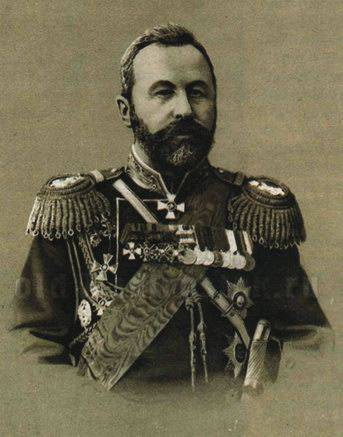 In order to pacify the rebels of Turkestan, troops numbering thousands of soldiers and officers armed with artillery and machine guns were sent to 30. General-Governor of Infantry Alexey Kuropatkin (22-1916), a renowned Russian military leader, who, admittedly, was also a talented manager, in particular, was able to find a common language with the Turkestani, was appointed Governor-General of Turkestan 1848 in July. This was due to the peculiarities of his biography - almost the entire long military career of General Kuropatkin was associated with service in Turkestan. By the end of the summer of 1925, Russian troops managed to put down an uprising in almost all areas of Samarkand, Syrdarya, Fergana and other areas. Only in the steppes of Turgai a strong center of uprising remained - the Kazakhs revolted under the leadership of Abdulgafar Zhanbosynov and Amangeldy Imanov. In Turgay, the rebels managed to create even the authorities, electing Abdulgafar Zhanbosynov Khan, and Amangeldy Imanov - Sardarbek (commander of the troops).
In order to pacify the rebels of Turkestan, troops numbering thousands of soldiers and officers armed with artillery and machine guns were sent to 30. General-Governor of Infantry Alexey Kuropatkin (22-1916), a renowned Russian military leader, who, admittedly, was also a talented manager, in particular, was able to find a common language with the Turkestani, was appointed Governor-General of Turkestan 1848 in July. This was due to the peculiarities of his biography - almost the entire long military career of General Kuropatkin was associated with service in Turkestan. By the end of the summer of 1925, Russian troops managed to put down an uprising in almost all areas of Samarkand, Syrdarya, Fergana and other areas. Only in the steppes of Turgai a strong center of uprising remained - the Kazakhs revolted under the leadership of Abdulgafar Zhanbosynov and Amangeldy Imanov. In Turgay, the rebels managed to create even the authorities, electing Abdulgafar Zhanbosynov Khan, and Amangeldy Imanov - Sardarbek (commander of the troops). The suppression of the uprising in Turkestan was extremely cruel. One can imagine the reaction of Russian soldiers and Cossacks, who entered the devastated villages and saw the tortured corpses of women, old people and children. The brutality of the Russian soldiers against the local population was thus a response to the atrocities that the insurgents committed. This is recognized by modern Central Asian historians - those of them who have not fallen into the swamp of nationalist demagogy. Thus, the Kyrgyz historian Shairgul Batyrbayeva writes: “Indeed, there was a harsh suppression of the uprising. But you can not be silent about the causes of this tragedy. When the punitive detachments sent to pacify the rebellion, saw the heads of Russian women and children seated on the forks, their reaction was appropriate. ” In total, thousands of civilians, mostly Russian women and children, were killed by the rebels at the hands of 3-4. 16 August 1916 Governor-General Alexei Kuropatkin reported to the Minister of War Dmitry Shuvaev about the death of 3478 Russian settlers. Human sacrifices were high on the other side. Although tendentious Soviet historians talked about the death of 100-150 by thousands of Kazakhs, Kyrgyz, Uzbeks during the suppression of the uprising, researchers who are more balanced in studying the issue say that about 4 thousands died from the side of the insurgents.
But the loss of the Turkestan population was really great - just not from the actions of the Russian troops. The harsh suppression of the uprising led to a new tragedy - the mass flight of Kyrgyz and Kazakhs to China - into the territory of East Turkestan. Tens of thousands of people fled to Xinjiang. The hard road through the mountains claimed many lives, and in Xinjiang, as it turned out, no one was waiting for the refugees. In order not to die of hunger, many families were forced to sell children to the Chinese.
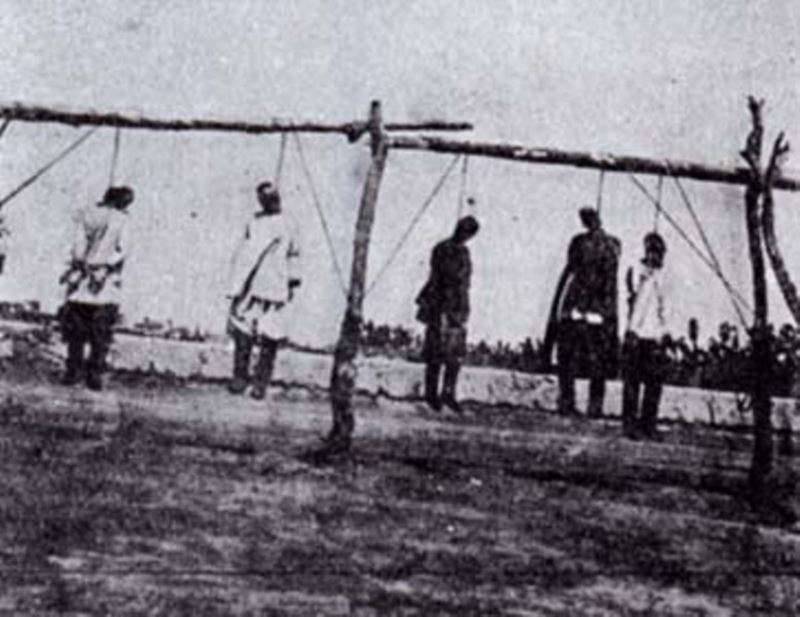
The economy and demography of Turkestan was greatly damaged - after all, according to various sources, from 40 thousand to 250 thousand people fled to China. The royal decree on mobilization was not fully implemented, because of which the uprising began - only about 100 thousand people, not 480 thousand people, as originally planned, were called on to work. In addition, the uprising led to a further deepening of the rift between the Russian-speaking population of Turkestan and local peoples. It was difficult for the Russians and the Cossacks to forget the consequences of ethnic cleansing, and for the Turkestans, the rigid suppression of the uprising. Nevertheless, the new governor-general Kuropatkin did everything possible to smooth the consequences of the tragedy unfolding in Turkestan. He was working on the possibility of creating separate Russian and Kyrgyz areas, which would allow to solve the land issue and avoid direct clashes. Kuropatkin understood that in order to normalize the situation in the region, it was necessary not only to punish the insurgents who launched the genocide of the Russian population, but also not to allow mob and massacres of the Turkestanians by the avenging Russians and Cossacks. However, the February revolution that had begun did not allow to realize these plans. A new dramatic period began in the history of Kazakhstan and Central Asia.
Information